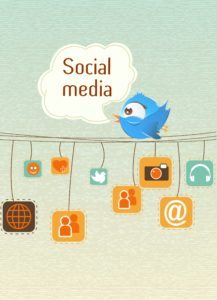Quick links, bringing you great articles on writing from all over the web.
Today’s social media post is all about Twitter, a great way to connect to people 150 characters at a time. Posting at Jane Friedman, Daniel Parsons explains the best way for authors to use Twitter.
~ * ~
Using Twitter to Make Powerful Connections as a Creative Professional
 Finding an audience for your books can seem like an insurmountable task when you enter the publishing space with no prior experience. Thankfully, Twitter can help you become not only an engaged member of the community but—in time—an influencer with a loyal audience.
Finding an audience for your books can seem like an insurmountable task when you enter the publishing space with no prior experience. Thankfully, Twitter can help you become not only an engaged member of the community but—in time—an influencer with a loyal audience.
Four years ago, I joined Twitter because I was writing my first book, and every blog post on the internet seemed to be saying the same thing: authors need a social media presence. Starting out, I had one goal, and that was to get 3,000 engaged Twitter followers. Why 3,000? Well, I had heard that you only start to get interactions on every tweet when you hit that number, and publishers wanted authors with ready-made, interactive audiences.
A lot has changed in the last four years. For a start, I discovered self-publishing and decided that I preferred it to the traditional route. One thing that hasn’t changed, however, is my focus on Twitter. I now have 93,000+ followers, reach 500,000 people every month, and get over 200 interactions per day. My followers have helped me grab the attention of powerful influencers, got one of my stories 30,000 reads on the story-sharing site Wattpad, and landed me a job at a publishing house. Along the way, they’ve helped my tweets trend above those of A-list celebrities—beating the likes of Craig David and Ryan Seacrest in various hashtag games.

 Twitter has hundreds of millions of daily users worldwide. It is both a way to engage one to one with people and a way to broadcast information. Writers use it every day for both. Search for #amwriting on Twitter and you will see some of the activity writers are engaging in on Twitter. Some of it is broadcasting. Some of it is looking for engagement.
Twitter has hundreds of millions of daily users worldwide. It is both a way to engage one to one with people and a way to broadcast information. Writers use it every day for both. Search for #amwriting on Twitter and you will see some of the activity writers are engaging in on Twitter. Some of it is broadcasting. Some of it is looking for engagement.